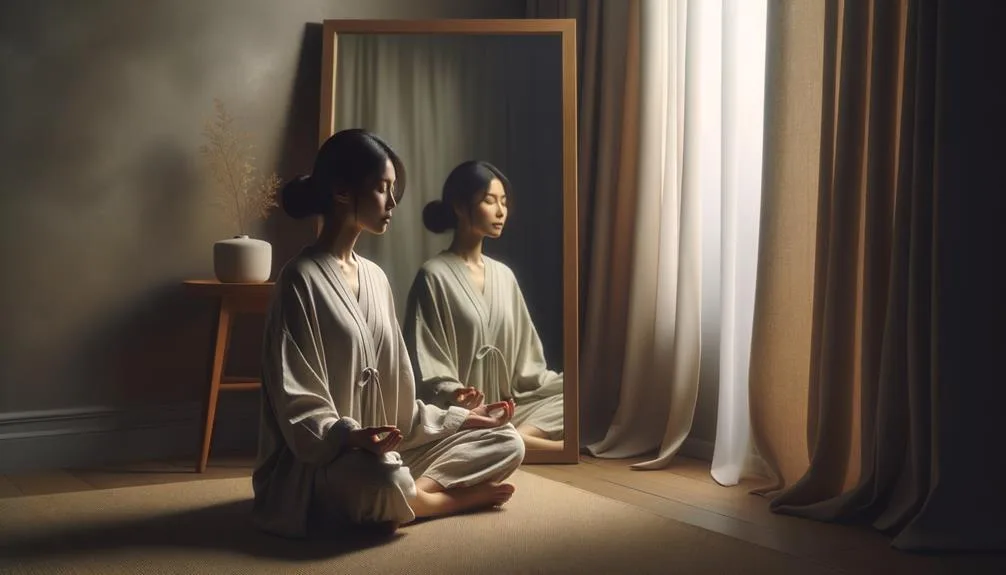Mirror meditation sits at the crossroads of self-exploration and discomfort, presenting an intriguing yet challenging journey for many. You're likely curious about its safety and the psychological impacts it may have on you.
While it's generally safe, this practice can stir up deep-seated emotions and thoughts, making it essential to approach with caution and mindfulness. If you're wondering how to navigate these waters without becoming overwhelmed, or if there are better alternatives suited to your emotional and mental well-being, stay tuned.
This discussion will shed light on the nuances of mirror meditation, ensuring you're well-informed before taking the plunge.
Key Takeaways
- Mirror meditation is generally safe with mindfulness and self-awareness practices.
- It may trigger intense emotional responses, requiring emotional readiness and self-care.
- Proper guidance and precautions, like proper lighting and relaxation techniques, optimize safety.
- Consulting mental health professionals is advised for those with deep-seated emotional issues.
Understanding Mirror Meditation
Gazing into a mirror, mirror meditation initiates a journey into self-awareness by reflecting one's true emotions and thoughts, offering a pathway to enhanced emotional regulation and authenticity. This practice isn't just about physical observation; it's a deep dive into the psyche, designed to unearth repressed emotions and fears. By confronting these hidden aspects, you're guided towards authentic self-expression, fostering a sense of self-compassion.
Mirror gazing meditation, though simple in concept, serves as a powerful tool for emotional exploration. As you lock eyes with your reflection, the barriers between your conscious and subconscious minds begin to blur. This process can reveal underlying feelings you've possibly ignored or suppressed, making it a unique method for emotional catharsis. However, it's crucial to approach this practice with caution. Given its potential to trigger discomfort or intense emotional responses, individuals with existing mental health concerns are advised to seek professional guidance before embarking on this journey.
In essence, mirror meditation is more than just staring at oneself; it's an invitation to confront and embrace the multifaceted nature of your emotions. Through consistent practice, it promises a route to greater emotional stability and a more authentic version of oneself.
Psychological Impacts Explored
As you explore the psychological impacts of mirror meditation, it's crucial to recognize its dual role in boosting self-awareness and triggering potential anxiety.
You'll find that while it offers a path to deeper self-understanding and acceptance, it also risks surfacing underlying fears and self-criticism.
Approaching this practice with mindfulness can help mitigate these risks, ensuring a safer journey towards self-discovery.
Boosting Self-Awareness
Mirror meditation significantly enhances self-awareness by enabling you to face your internal criticisms and judgments directly. This practice encourages you to confront the underlying emotional causes behind your behaviors and reactions.
By engaging in mirror gazing, you're not just looking at your physical reflection but also delving into the realms of authenticity and emotional awareness. This journey through self-observation leads to a stronger, more defined sense of self.
Furthermore, mirror meditation facilitates improved emotional regulation. As you explore your reflection, you embark on a direct route to emotional exploration and self-understanding. This heightened awareness is pivotal for personal growth, ensuring that you're not just aware of your surface emotions but also the deeper currents shaping your life.
Potential Anxiety Triggers
While mirror meditation offers profound insights into self-awareness, it can also stir up anxiety by bringing repressed emotions and fears to the surface. Engaging in mirror gazing, you may confront feelings of discomfort and vulnerability.
This reflective practice, meant to deepen self-awareness, might instead heighten anxiety levels for some, as it forces one to face intense emotional responses that have been long buried. Fear-based constructs, a result of deep self-reflection, can emerge, making the experience unsettling.
Therefore, it's crucial to approach mirror meditation with self-compassion and mindfulness. Acknowledging the potential for anxiety triggers and preparing to address them thoughtfully can make a significant difference in your journey towards self-discovery through the mirror.
Potential Risks Involved

Exploring the potential risks involved in mirror meditation reveals that it can trigger uncomfortable emotions and memories in some individuals. This practice, while beneficial for many, isn't without its downsides. You might find yourself facing heightened self-criticism or a negative self-perception that can be difficult to shake off. The act of gazing into your own eyes mightn't only be confronting but also lead to increased anxiety or emotional distress. It's crucial to approach mirror meditation with caution if you're prone to these feelings.
Moreover, mirror meditation can unearth repressed emotions, posing a challenge for those unprepared to process these complexities. This aspect of mirror meditation demands a level of self-awareness and emotional readiness that not everyone might possess at the start of their practice. Additionally, for some, the experience might prove overwhelming or triggering, suggesting that this method requires a thoughtful approach. It's important to listen to your own responses and proceed with care, recognizing when to step back.
In essence, while mirror meditation offers profound insights for many, it's essential to weigh these potential risks to ensure it aligns with your personal journey towards self-discovery and emotional well-being.
Comparative Analysis With Traditional Methods
You might wonder how mirror meditation stacks up against historical meditation practices.
It's important to note that while traditional techniques focus on mental tranquility through breath or mantra, the mirror method introduces a novel aspect of self-acceptance by confronting one's own reflection.
We'll explore the benefits of this modern practice and address any safety concerns to provide a comprehensive understanding.
Historical Meditation Practices
Mirror meditation, with its roots entrenched in ancient civilizations, presents a fascinating contrast to traditional meditation practices through its unique historical and cultural significance. While you might be familiar with sitting silently or chanting mantras, mirror meditation offers a distinct journey into the self, deeply rooted in history and spirituality.
Consider these intriguing aspects:
- Ancient Origins: Practiced in various cultures for centuries, linking participants with divine realms.
- Middle Ages & Renaissance: A resurgence in its use for divination and accessing deeper spiritual insights.
- Prophetic Visions: Served as a conduit for receiving prophetic messages and exploring hidden desires.
- Scientific Correlation: Modern studies suggest connections to altered states of consciousness and brain wave activation, hinting at its profound impacts beyond the spiritual realm.
Mirror meditation's rich historical tapestry underscores its significance and potential in personal and spiritual development.
Mirror Technique Benefits
Often, traditional meditation practices focus primarily on achieving mindfulness through breath awareness, yet mirror meditation introduces a novel approach by emphasizing self-reflection and emotional exploration. This method significantly enhances self-awareness and self-compassion by utilizing gazing techniques.
Unlike traditional methods that may skirt around the underlying emotional causes, mirror meditation directly confronts them. It allows you to identify and release repressed emotions, offering a unique pathway to self-discovery.
Furthermore, the visual and introspective component provided by the mirror adds depth to the meditation experience, which traditional practices may lack. In essence, mirror meditation enriches the meditative journey by facilitating a deeper understanding of oneself through focused gazing, setting it apart from conventional methods.
Safety Concerns Addressed
While generally considered safe, mirror meditation does present unique challenges and risks when compared to traditional meditation techniques, particularly for individuals facing deep-seated emotional issues. You're diving deep into your inner self, and this introspection can stir repressed emotions or fears.
To mitigate these risks and enhance your experience:
- Ensure proper lighting to avoid straining your eyes or creating eerie shadows.
- Maintain a comfortable distance from the mirror to avoid physical discomfort.
- Incorporate relaxation techniques before starting to ease into the process gently.
- Stay connected with your inner self and practice self-care, especially if emotional release occurs.
Precautionary Measures
To ensure the safety and effectiveness of mirror meditation, it's crucial to adopt several precautionary measures. Your approach to this practice should be both mindful and structured, allowing you to reap its benefits without encountering unnecessary discomfort or emotional distress.
Here's a quick guide to optimize your mirror meditation experience:
| Measure | Purpose | How to Implement |
|---|---|---|
| Proper lighting and distance | Avoid eye strain and discomfort | Adjust lights and sit at a comfortable distance from the mirror |
| Relax facial muscles and blink | Prevent tension and fatigue | Consciously relax your face and allow natural blinking |
| Accept self-conscious feelings | Work through initial discomfort | Acknowledge feelings without judgment and focus on your reflection |
| Stay connected with eyes and voice | Maintain presence and grounding | Keep eye contact and use affirmations if speaking |
Expert Opinions and Studies

Having established the foundational measures for a secure mirror meditation practice, let's now examine what experts and research studies reveal about its safety and effectiveness. Mirror meditation, as a practice, holds a unique place in the realm of mindfulness and self-awareness techniques.
Here's what the evidence suggests:
- General Safety: Research indicates that mirror meditation is generally safe when you're guided properly and maintain self-awareness. It's crucial to approach this practice with an open mind and heart.
- Emotional Regulation: Experts stress the importance of managing your emotions and exercising self-compassion during sessions. This involves recognizing and accepting your feelings without judgment.
- Consultation for Mental Health Concerns: If you have pre-existing mental health issues, seeking advice from a professional is advised before starting mirror meditation. This precaution ensures that the practice benefits rather than harms your well-being.
- Monitoring Emotional Responses: Paying close attention to how you react emotionally while gazing into the mirror is essential. Prioritizing self-care and not pushing beyond your comfort level are keys to a beneficial practice.
Understanding and adhering to these insights can significantly enhance the safety and effectiveness of your mirror meditation journey.
Individuals often report a range of unique and profound experiences during their mirror meditation sessions, shedding light on the practice's personal impact. When you first start mirror meditation, you might feel a bit uneasy, as if someone's watching you. But as you delve deeper, you'll likely notice an intense focus taking over. Your surroundings could become blurry, directing your attention solely to your reflection.
| Experience Type | Common Observations | Impact on Practitioner |
|---|---|---|
| Initial Discomfort | Feelings of being watched | Heightened self-awareness |
| Focus and Discovery | Noticing facial details | Deepened self-connection |
| Trance-like State | Unfamiliarity with reflection | Exploration of self-identity |
| Perceptual Changes | Facial shape shifting, peripheral movements | Expansion of consciousness |
This table encapsulates the spectrum of experiences reported by practitioners, from the initial discomfort to perceptual changes. Such experiences can lead to a profound journey of self-discovery. You might start by observing simple physical features like birthmarks or complexion differences and eventually enter a trance-like state where the person in the mirror seems entirely unfamiliar. These perceptual shifts, including facial shape shifting and movements in your peripheral vision, indicate the depth of mirror meditation's impact, offering a unique pathway to exploring and understanding oneself.
Frequently Asked Questions
Are Mirrors Good for Meditation?
Yes, mirrors are great for meditation. They enhance self-awareness and emotional exploration, backed by scientific research. This practice can lead to deeper spiritual growth and a stronger subconscious connection in a calm setting.
What Happens When You Meditate in Front of a Mirror?
When you meditate in front of a mirror, you enhance self-awareness and intuition. Studies show it can deepen your connection to the subconscious, making it a powerful tool for personal growth and spiritual development.
What Are the Benefits of Mirror Gazing Meditation?
Mirror gazing meditation boosts your self-awareness and emotional intelligence. You'll experience increased self-compassion and authenticity, connect deeply with hidden emotions, and access your subconscious for growth, addressing emotional roots for a more authentic self-perception.
Is It Good to Look at Yourself in the Mirror?
Looking at yourself in the mirror can be beneficial, fostering self-awareness and emotional growth. If done mindfully, it enhances well-being. Start with short sessions, and if you've mental health concerns, seek professional advice first.
Conclusion
In conclusion, while mirror meditation can unlock the door to self-discovery, it's not a one-size-fits-all solution. Treading these waters requires a mindful approach, as diving in without awareness might lead you to bite off more than you can chew emotionally.
By incorporating expert advice, adopting precautionary measures, and considering personal testimonials, you'll be better equipped to navigate its psychological impacts. Remember, safety in this introspective journey hinges on understanding its potential risks and benefits.

